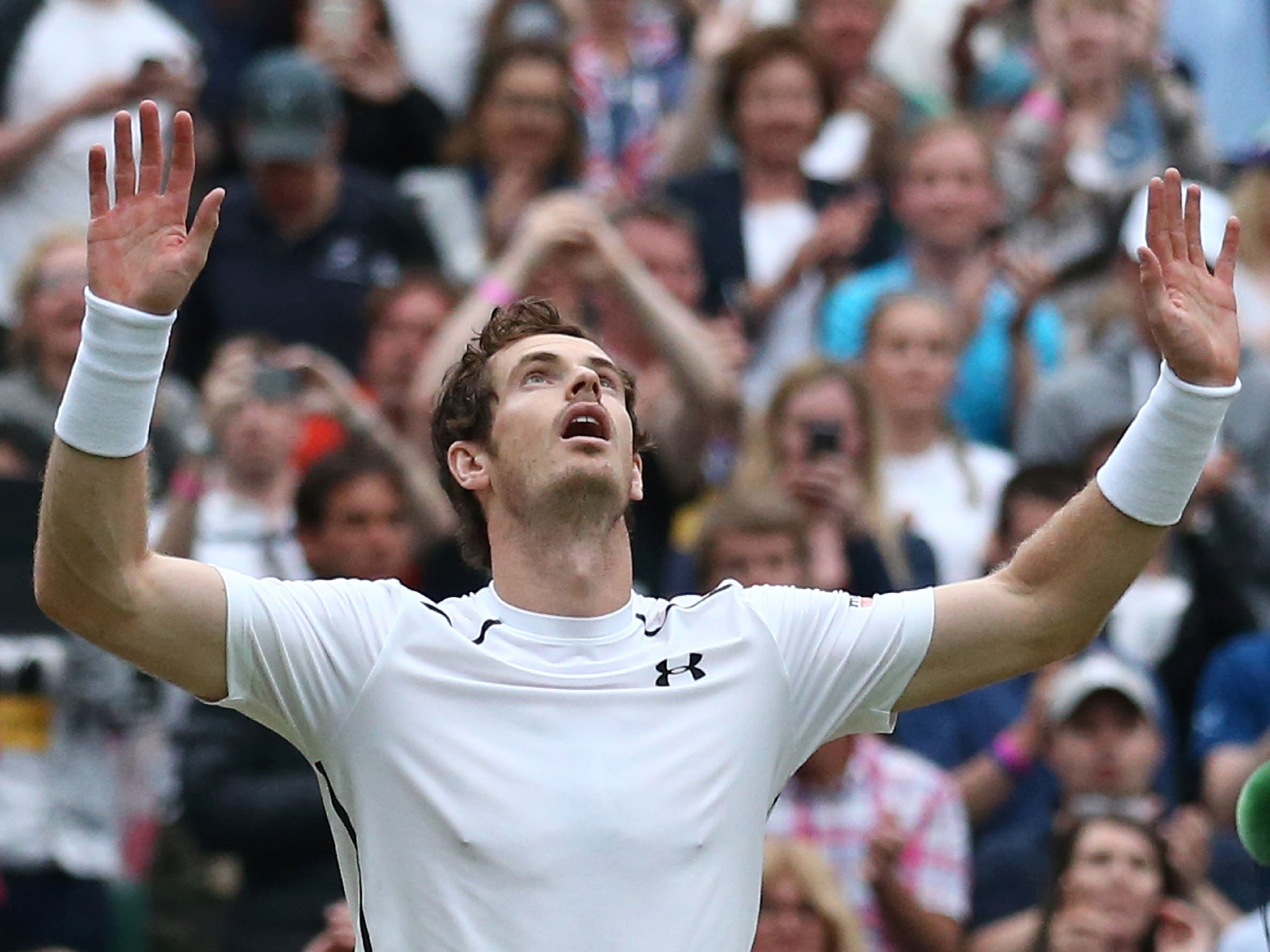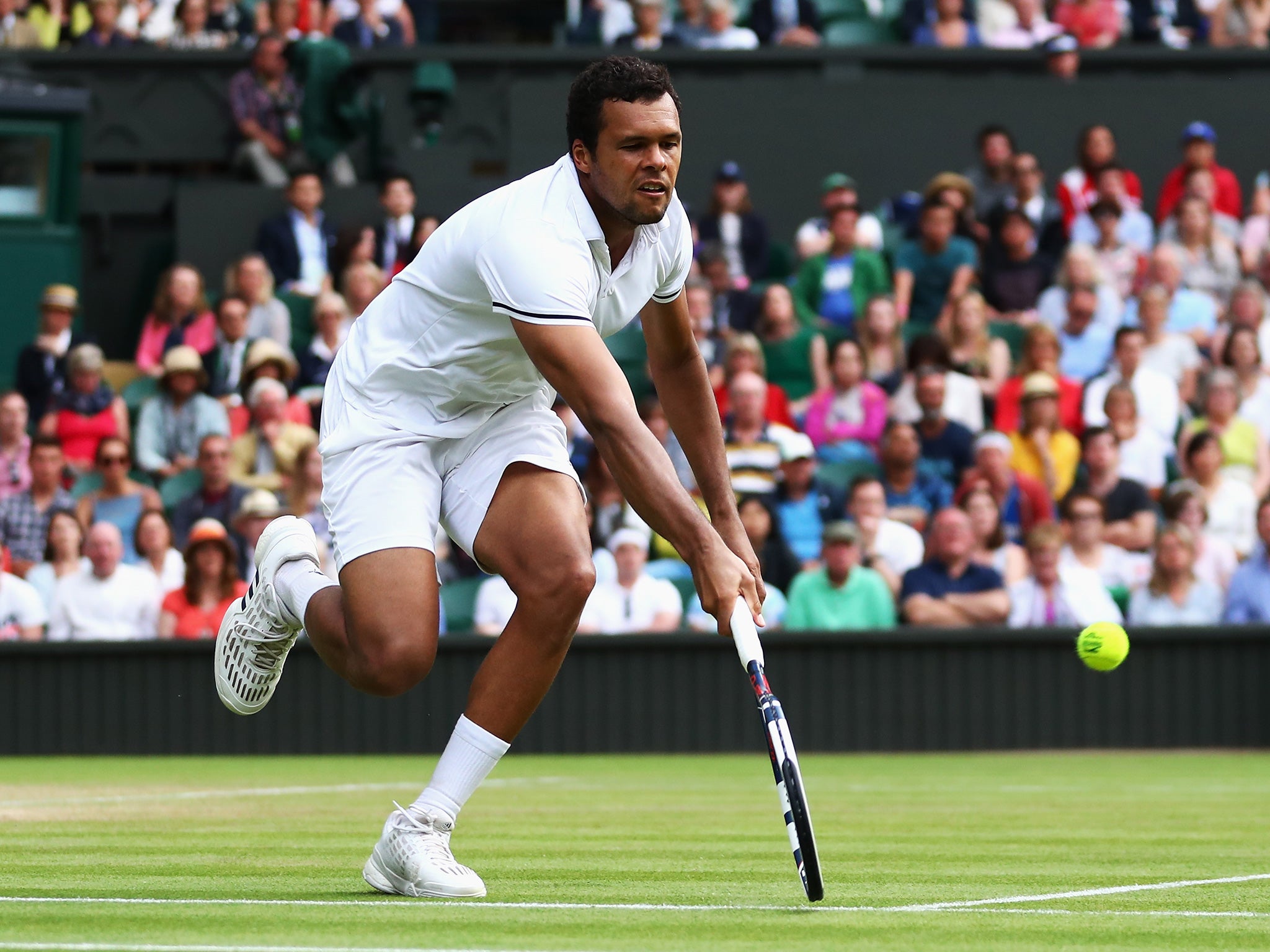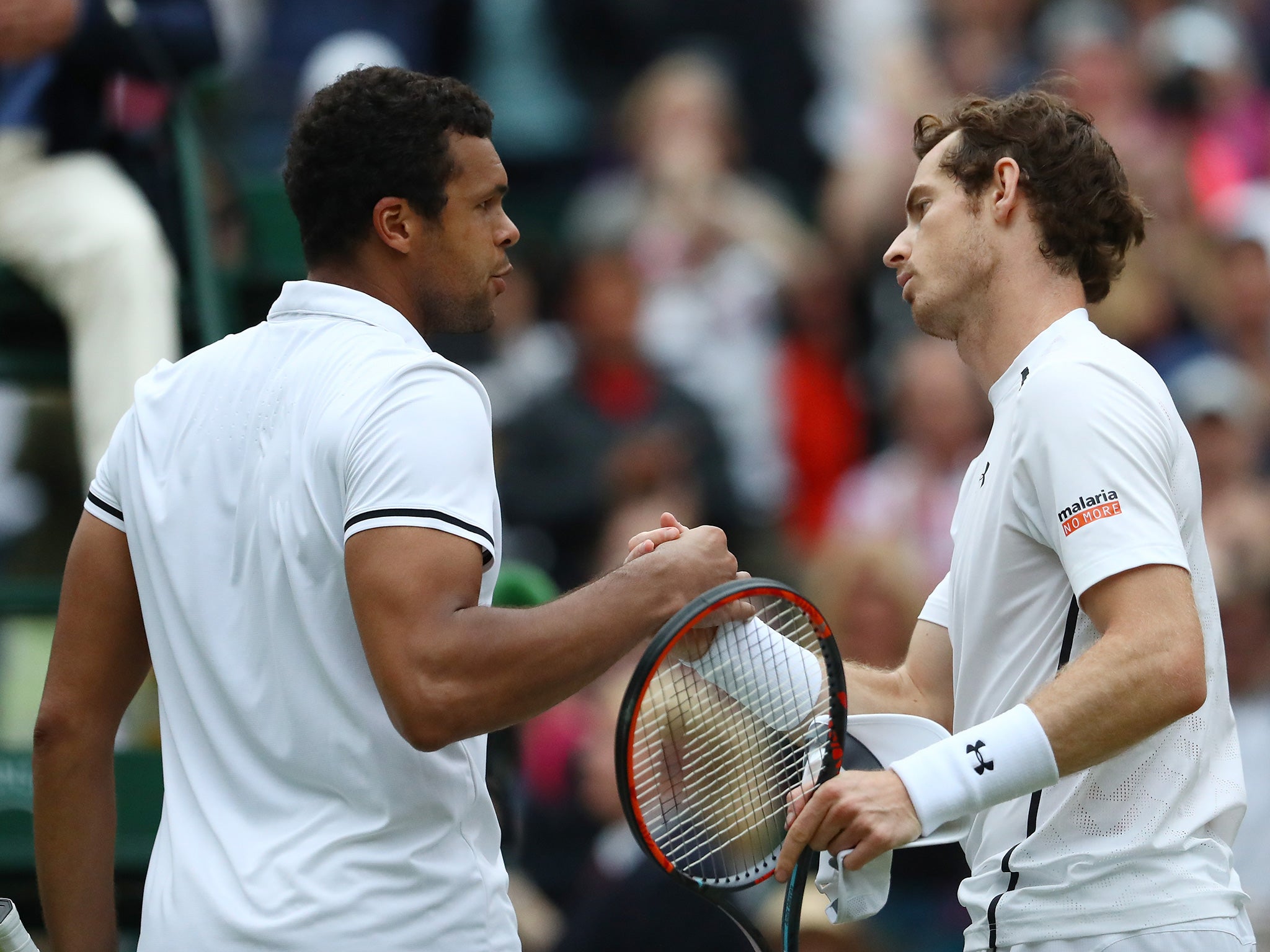Wimbledon: Andy Murray reaches semi-finals with win over Jo-Wilfried Tsonga
The Scot came through three hours and 53 minutes of play to face Tomas Berdych in the last four

Your support helps us to tell the story
From reproductive rights to climate change to Big Tech, The Independent is on the ground when the story is developing. Whether it's investigating the financials of Elon Musk's pro-Trump PAC or producing our latest documentary, 'The A Word', which shines a light on the American women fighting for reproductive rights, we know how important it is to parse out the facts from the messaging.
At such a critical moment in US history, we need reporters on the ground. Your donation allows us to keep sending journalists to speak to both sides of the story.
The Independent is trusted by Americans across the entire political spectrum. And unlike many other quality news outlets, we choose not to lock Americans out of our reporting and analysis with paywalls. We believe quality journalism should be available to everyone, paid for by those who can afford it.
Your support makes all the difference.What drama, what tension, what brilliance. Centre Court may never have witnessed a pair of quarter-finals quite like it as Roger Federer and Andy Murray, the two current players most loved by the public here, delivered victories that will live long in the memory.
Murray and Jo-Wilfried Tsonga had much to live up to after Federer’s remarkable comeback from two sets down to beat Marin Cilic, but the Scot and the Frenchman served up a humdinger of a match. Murray won 7-6, 6-1, 3-6, 4-6, 6-1 after three hours and 54 minutes to earn a semi-final meeting with Tomas Berdych, but only after Tsonga had staged a courageous fightback.
“I tried to use all of my energy at the beginning of the fifth set to try and get myself up and try and get the crowd pumped up,” Murray said afterwards. “It had been a long day for them with some long matches. Thankfully I got the early break and managed to hang on.”
He added: “The crowd were unbelievable today. I think they got two pretty good matches as well.”
Having won his first four matches in straight sets, Murray was pushed to the brink. Tsonga, who has a huge serve and a forehand to match, consistently attacked the net, played some beautiful volleys and hit some stunning winners on the run.
Murray, however, has been in these situations before. His comeback in the fifth set was reminiscent of the night he won his first Grand Slam title at the US Open in 2012, when he regrouped so admirably after Novak Djokovic had won the third and fourth sets. Here, Murray shouted to his box at the start of the deciding set: “I’m not going to lose this match.”
The Scot showed all his usual athleticism in chasing down balls and mixed his game up beautifully, frequently outsmarting Tsonga with his canny mix of thumping ground strokes, crafty spins and exquisite lobs.
It was wonderful entertainment for the crowd. Just about the only person among the 15,000 on Centre Court who was not regularly on his feet was Ivan Lendl, Murray’s coach. As usual, Old Stoneface sat there expressionless.
After his 27th successive victory over Frenchmen at Grand Slam tournaments Murray is through to his 20th Grand Slam semi-final and his seventh here. The only players ahead of him on the Open era list of Wimbledon semi-finalists are Federer (12 semi-finals), Jimmy Connors (11), Boris Becker (nine) and John McEnroe and Pete Sampras (eight each).
It was Murray’s 100th tour-level victory on grass, a total bettered among current players only by Federer, who has 151 wins to his name. It was also his 51st match victory at Wimbledon, which equals Bjorn Borg’s total.
There were two breaks of serve in a ferociously competitive opening set. Two successive double faults cost Tsonga his serve in the fifth game, while a backhand winner saw the Frenchman level at 4-4.

The tie-break produced some superb tennis as both men saved three set points before Murray won it 12-10. After Tsonga had gone 6-4 up with a series of brutal attacks, Murray saved two successive set points with an ace and then a courageously aggressive forehand return.
After the tie-break had tilted one way and then the other it reached a glorious conclusion after Tsonga saved a set point at 9-10. On the next point Murray flew across the court to dig out a stop volley which he had no right to reach and cracked a forehand down the line which Tsonga was unable to get back. A fired-up Murray encouraged the crowd to pump up the volume and took the set on the next point with a volley winner.
Tsonga’s disappointment was evident in the second set. The Frenchman had been fully focused on his task until that point, but a series of loose shots allowed Murray to run away with the set. Having needed 76 minutes to win the first set, Murray needed only 26 minutes to double his advantage.
The world No 2 appeared to be coasting, but Tsonga quickly got himself together at the start of the third set. The Frenchman broke to go 3-1 up as Murray played his poorest service game of the match and then served out for the set.
Murray broke in the fifth game of the fourth set, only for Tsonga to respond in kind. At 4-4 the Frenchman broke again with a stunning backhand pass down the line and proceeded to level the match.
Was Murray about to lose from two sets up for only the second time in his career, the first occasion having been on his Wimbledon debut in 2005, when he lost to David Nalbandian?
No he was not. The world No 2 responded superbly. Having saved a break point in the opening game, he celebrated loudly after breaking serve to go 2-0 up and was soon 5-0 ahead. Just before he served out for victory the television cameras focused on Lendl, who appeared to be yawning. If there was any danger of Murray’s coach nodding off that was averted moments later when Centre Court erupted after the Scot secured victory with an ace.

Murray said afterwards that the crowd’s support had spurred him on. “I think it can help,” he said. “That's why it's important to try to use the crowd, if you can, to your advantage, because they do make a difference. In long matches, tough matches, even if it’s half a percent difference, it’s good. I try to get the crowd into it as much as I can when I’m playing a home tournament.”
The Scot hopes that having been being pushed so hard might help him in the challenges ahead. “I was definitely tested a lot today,” he said. “It was a really hard, hard match to come through. I think that can give you a bit of confidence. It can help to go through games and stages in matches that are challenging. If you’re in that position in the next couple of matches, you know you’ve been there.”
Murray has beaten Berdych in their last four meetings, but before that the Czech led their head-to-head record 6-4. Murray has won two of their three Grand Slam encounters and they have never met on grass.
“We've played a few times over the last couple of years on different surfaces, but never on grass,” Murray said. “I’ll have to have a look and see some of his matches to get an idea of maybe some of the things he does differently on the grass courts, what his strengths are, maybe some of the things he struggles with a bit.
“Obviously he’s a big guy who serves well. When he’s dictating the points, he hits a big, big ball. He’s a powerful guy. Ideally, I don’t want to have him dictating all of the points because then I’ll be doing a lot of running.”
Berdych needed only an hour and 55 minutes to beat Lucas Pouille 7-6, 6-3, 6-2. The 22-year-old Frenchman, who had never previously gone beyond the second round of a Grand Slam tournament, found himself outhit as Berdych reached his second Wimbledon semi-final. The 30-year-old Czech, who is playing in his 52nd consecutive Grand Slam tournament, went on to reach his only final here in 2010 before losing to Rafael Nadal.
Join our commenting forum
Join thought-provoking conversations, follow other Independent readers and see their replies
Comments